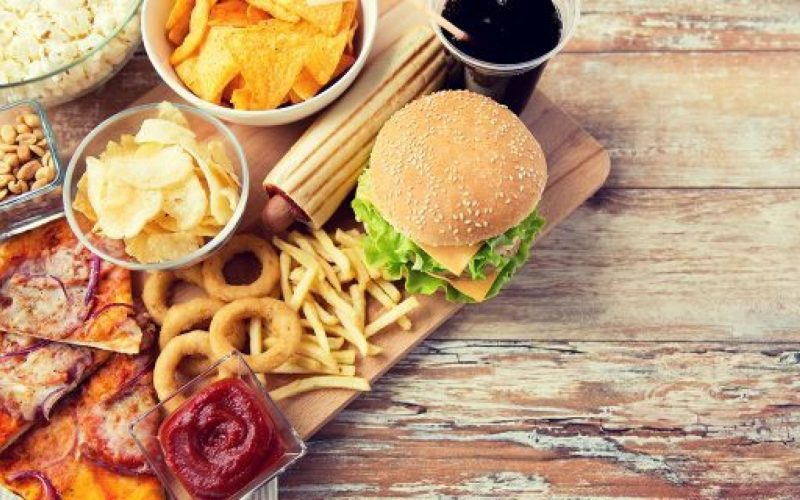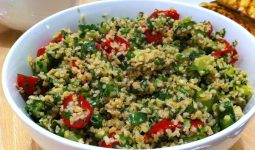There are greasy foods found in fast food joints, offices, restaurants, schools, and even at home. Many fried or cooked foods with excess oils are known as greasy foods.
French fries, potato chips, deep-dish pizzas, rings of onions, cheeseburgers, and doughnuts are included.
These foods have high fibre, vitamins, and minerals content but are low in calories, fat, salt, and refined carbs. While they can be a delicious treat on special occasions, both in the short and long term, greasy foods have a detrimental effect on your body and health.
Here are seven impacts on your body from greasy foods:
May induce bloating stomach pain and diarrhea
Fat is the most slowly digested of the macronutrients that include carbs, fat, and protein. This is because greasy foods contain high-fat levels, and they delay the emptying of the stomach.
If the food spends much time in your stomach, it can cause stomach pain, nausea, and bloating.
High levels of fatty foods can cause stomach pain, cramping, and diarrhea in people that have digestive complaints that include irritable bowel syndrome (IBS), chronic pancreatitis, or a stomach bug.
Your gut microbiome can be compromised
The healthy bacteria that can be found in your gut are believed to be harmed by greasy foods. This microorganism array, also called the gut microbiome, affects the following:
- Fibre digestion
Bacteria in your gut break down fibre to create anti-inflammatory effects of short-chain fatty acids (SCFAs), which can protect against digestive disorders.
- Immune response
The gut microbiome interacts with immune cells to better monitor the response of your body to infections.
- Regulating weight
An imbalance of gut bacteria can contribute to weight gain.
- Gut health
Intestinal microbiome disturbances are associated with IBS growth, and while probiotics exist, healthy microorganisms found in some foods can help improve symptoms.
- Heart health
Good gut bacteria may help increase HDL cholesterol that protects the heart, while harmful species may produce compounds that damage the arteries, leading to heart disease.
A high-fat diet, such as one rich in greasy foods, can harm your gut microbiome by raising the number of unhealthy gut bacteria and decreasing healthy ones.
These adjustments may be associated with obesity and other chronic illnesses, such as cancer, heart disease, diabetes, and Parkinson’s disease. All the same, more research is required on diet and gut health.
It can lead to obesity and weight gain
Greasy foods cooked in large quantities of fat can cause weight gain because of their high-calorie count. For instance, a small baked potato contains 93 calories and 0.1 grams of fat, while 312 calories and 15 grams of fat are packed in the same size of french fries.
Clinical studies relate higher rates of weight gain and obesity to increased consumption of fried foods. Obesity is associated with multiple adverse health problems, including heart disease, diabetes, stroke, and some cancers. A high intake of trans fat, in general, can contribute to weight gain.
When vegetable oils are chemically altered to remain solid at room temperature, trans fats are formed. They are still used in many greasy foods, despite restrictions on their use, because of the use of partially hydrogenated vegetable oils in frying as well as food processing.
Animal studies note that trans fats can contribute to small increases in weight even without excess calorie consumption. Also, an 8-year study of 41,518 women found that those with excess weight gained an additional 2.3 pounds (1 kg)with every 1 percent increase in their trans fat consumption.
While this result has not been confirmed by other research, consuming greasy foods frequently is likely to impair weight control.
You may be at risk of heart disease and stroke
Greasy food has several adverse effects on the health of the heart. For example, fried foods, which are all associated with heart disease, have been shown to raise blood pressure, lower HDL ( good) cholesterol, and contribute to weight gain as well as obesity.
For instance, research indicates that potato chips increase inflammation and can lead to heart disease. Also, the risk of heart disease may be related to how much you consume fried foods.
A study found that there was a 48 percent greater risk of heart failure for women who ate one or more portions of fried fish per week than those who ate just 1 – 3 servings per month.
In another report, there was a 63 percent greater risk of heart attack or stroke in people who ate two or more portions of fried fish per week than those who ate one or fewer servings per month.
In addition, a major observational study correlated consuming fried foods, pizza, and salty snacks with a 16 percent increased risk of stroke in 6,000 individuals across 22 nations.
May increase your risk of diabetes
Greasy foods can increase your risk of type 2 diabetes. Consumption of fast food, which involves unhealthy foods and sugar drinks, leads to high consumption of calories, weight gain, poor blood sugar regulation, and increased inflammation.
These variables, in turn, raise the risk of type 2 diabetes, metabolic syndrome, and other groups of disorders, including high blood pressure, obesity, and high blood sugar.
For example, a large observational study showed that consuming fried foods 1-3 times a week increases the risk of type 2 diabetes by 15 percent, but the risk increased by 55 percent in 7 or more instances per week.
Another research showed that, relative to those who ate them less than once a week, people who ate fast food more than two days a week had double the risk of developing insulin resistance, which can cause diabetes.
May cause acne
Most people relate greasy foods to acne and breakouts. Studies linked the Western diet, which is rich in processed carbohydrates, fast food, and greasy products, with acne. A survey of over 5,000 Chinese adolescents found that consuming fried foods on a daily basis raises the risk of acne by 17%.
In addition, another study of 2,300 Turkish teenagers found that consuming greasy foods such as sausages and burgers raised the risk of acne by 24 percent. However, the exact mechanism behind this impact remains unknown. Some researchers suggest that a poor diet can influence gene expression and alter hormone levels in a manner that promotes acne.
Western diets with a high proportion of fatty acids from omega-6 to omega-3 can also cause increased inflammation that results in acne.
While omega-3s exist in oily fish, algae, and nuts, omega-6s can be gotten from vegetable oils, nuts, and seeds. The omega-6s are high in oils used in frying greasy foods and can therefore lead to an imbalance in this proportion.
Some greasy foods are also high in processed carbs, such as fried doughnuts. They are carbohydrates, which are deprived of their fibre, several nutrients, and processed grains.
Since sugary foods increase the activity of certain hormones in your body, including androgens and insulin-like growth factor 1 (IGF-1), this can promote acne by advancing the development of skin cells and natural skin oils.
May damage brain function
A diet that is rich in greasy, fatty foods can cause brain function disorders. High blood pressure, weight gain, and metabolic syndrome linked with greasy foods are also associated with damage to the brain’s structural system, tissues, and operation.
Two major studies linked diets high in fatty and fried foods to a decrease in learning capacity and memory, as well as an increase in inflammation in 5,083 and 18,080 individuals, respectively. Furthermore, diets rich in trans fats have been associated with impairments in brain function.
One study in 1,018 adults linked each gram of trans fat ingested per day with worse word recall and demonstrating memory loss.
Also, in a study of 38 women, high consumption of saturated and trans fats was associated with lower word memory and recognition, as well as more unsatisfactory performance in spatial tasks.
Although some findings were contradictory, a study of 12 studies linked trans and saturated fat to dementia risk. Further research is required to confirm this.
How to avoid greasy foods
There are different ways of limiting or eliminating greasy food consumption. This involves not only safe practices of cooking but lifestyle choices as well.
Use healthier approaches to cooking
Greasy foods are also fried, meaning that a lot of them are cooked in oil. Methods which do not use as much oil include the following:
- Oven frying
This includes baking at a very high temperature (450 ° F or 230 ° C), which enables the use of little to no oil to make food crispy. As an alternative to french fries, this method works exceptionally well with potatoes.
- Air frying
Hot air is pumped around food by air-frying devices, making it crispy on the outside but soft on the inside. It uses 70-80% less oil than conventional frying methods, which means your food won’t get greasy.
- Steaming
This method makes use of steam from hot water and needs no oil. When cooking foods such as dumplings, fish, and vegetables, it’s a perfect substitute.
- Grilling
You don’t require too much oil for grilling. This technique is particularly useful for meats and vegetables.
Ensure you use a skimmer to let the grease drip off and place the food on a paper towel to absorb the excess grease if you don’t want to forego frying altogether.
Substitute greasy foods with healthy choices
You can substitute fried foods with whole, nutritious options with minimal effort. Here are a few alternatives for traditional greasy foods:
- Burgers
Try making your burgers at home with ground beef, lettuce, and whole-grain buns instead of going to the fast-food restaurant.
- Fries
A better alternative to french fries is oven-baked potatoes. Make use of other root vegetables like sweet potatoes, parsnips, and carrots to make it different.
- Pizza
Try making Italian thin-crust pizza at home instead of ordering deep-dish styles. You can use store-purchased or homemade dough with organic tomatoes, vegetables, and lean meats. Gently use the cheese to eliminate the fat.
- Potato chips
Lightly salted green beans, try crispy baked kale, or wedges of baked tortillas or pita with hummus or edamame when you get a craving for a salty fare.
- Chips and fish
Fish is exceptionally nutritious, but much less so when seasoned and fried. Pan-seared/baked fish with mashed potatoes, baked vegetables, or salad are fine alternatives.
- Chinese takeout
A lot of Chinese takeaway dishes are greasy and fried. Try veggie-heavy stir-fries, steamed dumplings, and soups instead of your usual choices.
- Fried chicken
Rather than being fried, chicken can easily be baked or grilled.
- Doughnuts
If you want anything sweet, try smoothies, whole grain muffins with fruit or nuts, baked apple chips, or a piece of fruit.
Greasy foods are high in calories and unhealthy fats that include fries, chips, pizza, and doughnuts. A high intake of these foods can contribute to weight gain, obesity, heart disease, diabetes, bloating, diarrhea, acne, and decreased brain function.
Although eating fried foods on special occasions is perfectly appropriate, you should strive to restrict your consumption and select healthier alternatives.








